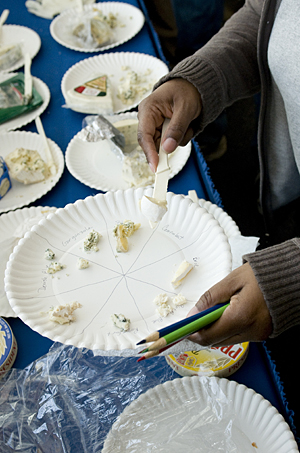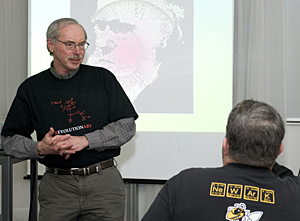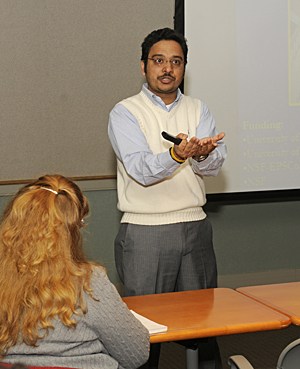


- Rozovsky wins prestigious NSF Early Career Award
- UD students meet alumni, experience 'closing bell' at NYSE
- Newark Police seek assistance in identifying suspects in robbery
- Rivlin says bipartisan budget action, stronger budget rules key to reversing debt
- Stink bugs shouldn't pose problem until late summer
- Gao to honor Placido Domingo in Washington performance
- Adopt-A-Highway project keeps Lewes road clean
- WVUD's Radiothon fundraiser runs April 1-10
- W.D. Snodgrass Symposium to honor Pulitzer winner
- New guide helps cancer patients manage symptoms
- UD in the News, March 25, 2011
- For the Record, March 25, 2011
- Public opinion expert discusses world views of U.S. in Global Agenda series
- Congressional delegation, dean laud Center for Community Research and Service program
- Center for Political Communication sets symposium on politics, entertainment
- Students work to raise funds, awareness of domestic violence
- Equestrian team wins regional championship in Western riding
- Markell, Harker stress importance of agriculture to Delaware's economy
- Carol A. Ammon MBA Case Competition winners announced
- Prof presents blood-clotting studies at Gordon Research Conference
- Sexual Assault Awareness Month events, programs announced
- Stay connected with Sea Grant, CEOE e-newsletter
- A message to UD regarding the tragedy in Japan
- More News >>
- March 31-May 14: REP stages Neil Simon's 'The Good Doctor'
- April 2: Newark plans annual 'wine and dine'
- April 5: Expert perspective on U.S. health care
- April 5: Comedian Ace Guillen to visit Scrounge
- April 6, May 4: School of Nursing sponsors research lecture series
- April 6-May 4: Confucius Institute presents Chinese Film Series on Wednesdays
- April 6: IPCC's Pachauri to discuss sustainable development in DENIN Dialogue Series
- April 7: 'WVUDstock' radiothon concert announced
- April 8: English Language Institute presents 'Arts in Translation'
- April 9: Green and Healthy Living Expo planned at The Bob
- April 9: Center for Political Communication to host Onion editor
- April 10: Alumni Easter Egg-stravaganza planned
- April 11: CDS session to focus on visual assistive technologies
- April 12: T.J. Stiles to speak at UDLA annual dinner
- April 15, 16: Annual UD push lawnmower tune-up scheduled
- April 15, 16: Master Players series presents iMusic 4, China Magpie
- April 15, 16: Delaware Symphony, UD chorus to perform Mahler work
- April 18: Former NFL Coach Bill Cowher featured in UD Speaks
- April 21-24: Sesame Street Live brings Elmo and friends to The Bob
- April 30: Save the date for Ag Day 2011 at UD
- April 30: Symposium to consider 'Frontiers at the Chemistry-Biology Interface'
- April 30-May 1: Relay for Life set at Delaware Field House
- May 4: Delaware Membrane Protein Symposium announced
- May 5: Northwestern University's Leon Keer to deliver Kerr lecture
- May 7: Women's volleyball team to host second annual Spring Fling
- Through May 3: SPPA announces speakers for 10th annual lecture series
- Through May 4: Global Agenda sees U.S. through others' eyes; World Bank president to speak
- Through May 4: 'Research on Race, Ethnicity, Culture' topic of series
- Through May 9: Black American Studies announces lecture series
- Through May 11: 'Challenges in Jewish Culture' lecture series announced
- Through May 11: Area Studies research featured in speaker series
- Through June 5: 'Andy Warhol: Behind the Camera' on view in Old College Gallery
- Through July 15: 'Bodyscapes' on view at Mechanical Hall Gallery
- More What's Happening >>
- UD calendar >>
- Middle States evaluation team on campus April 5
- Phipps named HR Liaison of the Quarter
- Senior wins iPad for participating in assessment study
- April 19: Procurement Services schedules information sessions
- UD Bookstore announces spring break hours
- HealthyU Wellness Program encourages employees to 'Step into Spring'
- April 8-29: Faculty roundtable series considers student engagement
- GRE is changing; learn more at April 15 info session
- April 30: UD Evening with Blue Rocks set for employees
- Morris Library to be open 24/7 during final exams
- More Campus FYI >>
3:33 p.m., March 3, 2009----Fifteen Delaware public school teachers met at the Delaware Biotechnology Institute and the University of Delaware's Hugh R. Sharp Campus in Lewes Feb. 20-22 for a “biotechnology weekend.”
Sponsored by Delaware's National Science Foundation Experimental Program to Stimulate Competitive Research (EPSCoR) outreach program and the DuPont Office of Education, the three-day workshop was offered to middle and high school teachers (grades 6-12).
The workshop provided teachers with new instructional methods, such as hands-on laboratories and exposure to the latest cutting-edge research applications. Instructors, including seasoned teachers and scientists in the field, also addressed the historical roots of biotechnology and its current applications in human health and agriculture.
“Most Delaware public school teachers see about 150 students each week, so involving even a small group of teachers has the potential to impact a large audience of students,” said Jeanette Miller, assistant director of the Delaware Biotechnology Institute. “Life science is an important part of the state science curriculum and standardized testing program. Professional development retreats like this one help teachers stay current. We want teachers to feel connected to life science at the University of Delaware.”
Participating teachers received the materials that would help them incorporate biotechnology into their courses and present the subject clearly and effectively in their classrooms.
The weekend began on Friday night at the Delaware Biotechnology Institute, where teachers toured the building and met research scientists who are solving real-world problems through biotechnology.
Harsh Bais, an EPSCoR-funded assistant professor in the University of Delaware's Department of Plant and Soil Sciences, whose lab is based at DBI, spoke to the teachers about his research group's work on invasive plant species and the molecular biology of those species.
On Saturday in Lewes, teachers heard from workshop coordinator Bill Hall of the College of Marine and Earth Studies, who explained biotechnology as a concept and offered historical background on the subject.
“Biotech is a misunderstood term, because it incorporates so many of the sciences,” said Hall. “Our purpose in this workshop is to get teachers to understand the roots of biotech and how it affects our daily lives, from the grocery store to the hospital.”
Barbara Campbell, an assistant professor in the College of Marine and Earth Studies, provided workshop participants with information about microbes and genomics and their relationship to biotechnology.
Campbell also discussed the research at the Lewes campus that uses biosciences, often in pursuit of biotechnological advances. Campbell and one of her graduate students, Katrina Twing, demonstrated molecular techniques such as polymerase chain reaction, or PCR, and cloning.
Campbell said she has taught the workshop three times and noted that there is usually a wide range of teacher backgrounds and interests.
She said she makes sure to encompass both the broad topic and to focus in on a few narrow items to make it interesting. “I like the interactions and hope the teachers will be able to excite their students in pursuing scientific careers,” said Campbell.
Harry Dillner, who taught biology at Christiana High School from 1967 to 1996 and worked as a science education specialist for the Delaware Department of Education from 1996 until 2003, presented the lesson “DNA: The Ultimate Forensic Record of Evolution.”
“During this anniversary year of Charles Darwin's birth and the publication of his On the Origin of Species, it is fitting that the EPSCoR workshop include a session on how molecular genetics has confirmed and expanded our understanding of his theory of natural selection,” said Dillner. “It is my hope that teachers will take from the session information about DNA that will bolster their subject matter expertise, ultimately resulting in students who have fewer misconceptions and a better grasp of the rapid changes occurring in genetics and evolution. It is also important that teachers and students understand that new advances in molecular biology hold the key to solving practical problems that range from endangered species to understanding and treating diseases such as cancer and AIDS.”
Teachers agreed that the weekend left them with a better sense of how biotechnology can be used to understand and monitor environmental health and improve the economy through job growth.
Victoria Deschere, a science teacher at Louis L. Redding Middle School in Middletown, said, “There were 'aha' moments when the information was applicable in a way I had not seen before and might excite my students.”
Deschere said she would recommend the workshop to other teachers. “It did give me many ideas for improvements to lessons I taught or a few I would like to add.”
Article by Katie Ginder-Vogel


